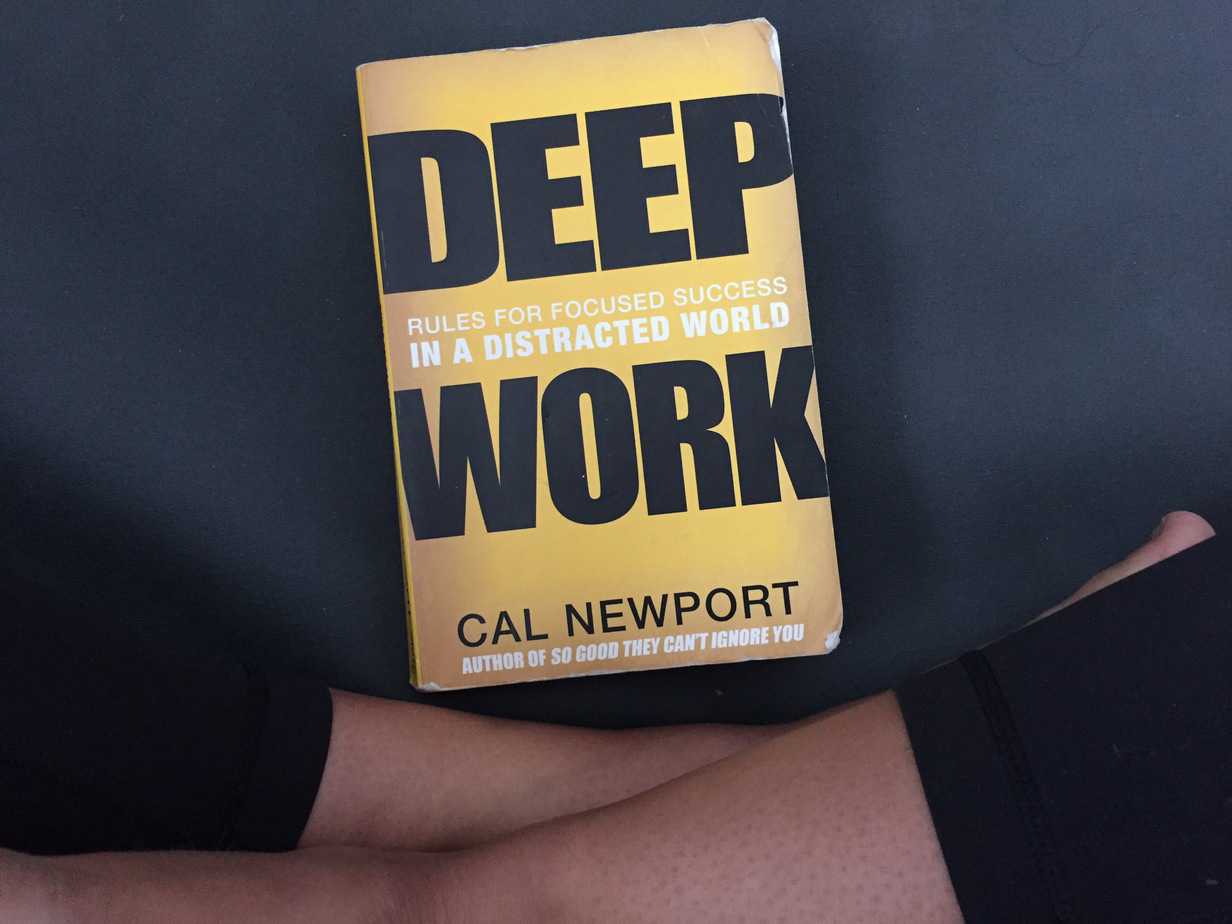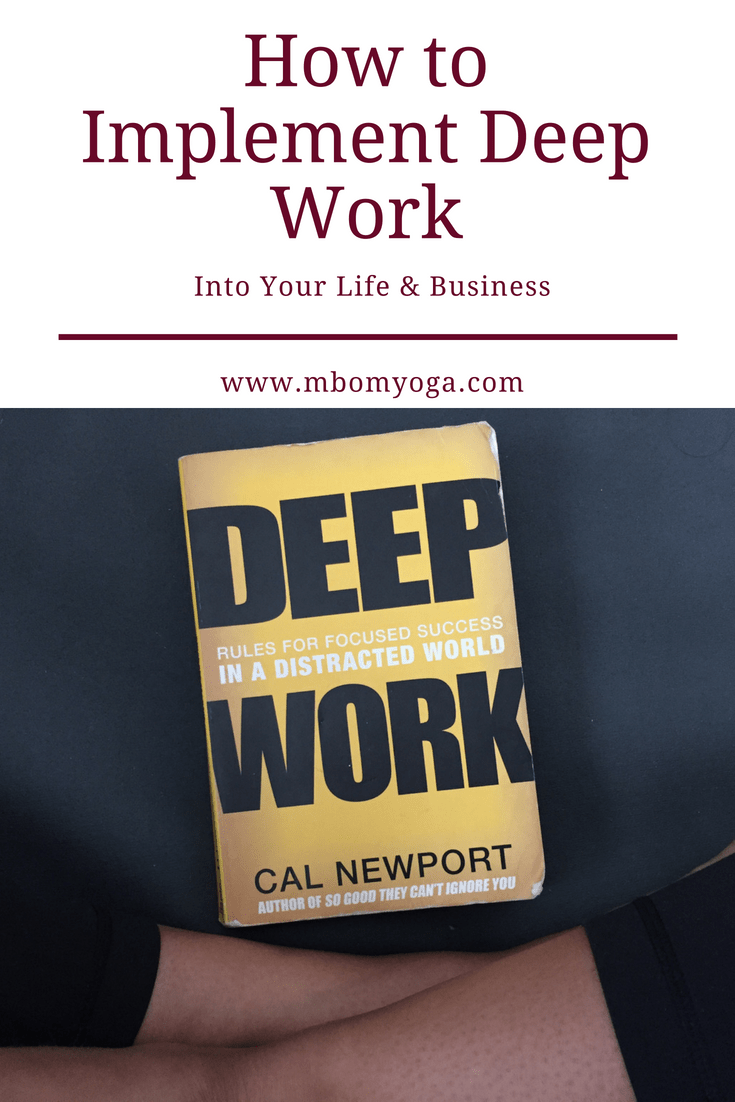I recently finished Cal Newport’s Deep Work. It was a great book, but, in my opinion, way too long. This post will walk you through the principles of Deep Work in a condensed variation and help you to understand how you can apply Deep Work in your life and business without having to read the book (if you don’t want).
To begin with, let’s define what Deep Work is. Deep work is “the ability to focus without distraction on a cognitively demanding task. It’s a skill that allows you to quickly master complicated information and produce better results in less time.”
Principles of Deep Work
1. Deep Work is Valuable
The ability to quickly master hard things
Newport argues that Deep Work can help us quickly learn hard things. When we deliberately practice things, our attention is focused on a specific skill or task. If we are trying to learn a new skill and we spend dedicated time mastering it, we will be able to learn and improve that skill faster. It is challenging to master a new skill when we are distracted, so when we dedicate uninterrupted time to learning something new, we can learn it with uninterrupted concentration, and thus learn it faster.
“Let your mind become a lens, thanks to the converging rays of attention; let your soul be all intent on whatever it is that is established in your mind as a dominant, wholly absorbing idea.” – Antonin-Dalmace Sertillanges
The ability to produce at an elite level, in terms of both quality and speed
Newport argues that by spending long, uninterrupted stretches of time working on projects, we can not only be more productive, but we can also produce more, and produce that faster. This means that instead of focusing our attention on a number of different things at one time, we can schedule in longer chunks of time where we focus on singular projects, which will in turn allow us to complete more.
He uses the following equation to explain this concept: High-Quality Work Produced = (Time Spent) x (Intensity of Focus)
2. Deep Work is Rare
The concept that Deep Work is rare comes from the idea that although many companies know the importance of Deep Work, they are still not practicing it. The open office concept is a good example. More and more companies, including innovative companies like Facebook, are changing their offices to a more open concept.
In the previous section, it is mentioned how valuable Deep Work is, and because of this, it’s interesting to see some of the major players in the business world who are “hoping to get the most out of their employees” prioritizing things like collaboration, rapid communication, and an active presence on social media over Deep Work.
It seems that although many companies understand the ideas of Deep Work, they don’t see that the benefits of Deep Work outweigh many of the benefits of an open office concept, where there is an easy and quick exchange of ideas, but it’s hard to dive deep into those productive stretches of uninterrupted work.
Something that many companies these days are encouraging is the constant connectivity to email. Many employees are expected to read and respond to emails within an hour of them coming in, and although it is argued that this is necessary in a fast-paced business environment, Newport makes claims that it doesn’t really help your work to be constantly connected.
Many people worry that by not being constantly connected we could disappoint and lose clients, and Newport gives several examples of how not responding to emails within an hour does not directly correlate to losing clients, but it does often improve people’s enjoyment of their work and help them create better products and services from the time spent doing Deep Work.
3. Deep Work is Meaningful
Much of the work we do day-to-day has a level of importance to it, but how often are we pulled out of a period of solid focus because someone has a question or an email come through that seems important but actually isn’t?
Most of us spend the majority of our day dealing with “shallow” concerns, like back and forth dialogue via email, meetings, phone calls, etc. If we spend more of our time on Deep Work, we gather a lot more meaning from our work, especially in the long-term.
“In work (and especially knowledge work), to increase the time you spend in a state of depth is to leverage the complex machinery of the human brain in a way that for several different neurological reasons maximizes the meaning and satisfaction you’ll associate with your working life.”
Part of this can be explained by the fact that practicing Deep Work can help us get into a flow state. This is a highly enjoyable state where we feel like we are one with the task that we are doing or the thing that we are studying.
Have you ever spent uninterrupted time working on a project and got so lost in it that four or five hours past and you had no idea? That’s a flow state, and that’s the idea around Deep Work being meaningful.
The Rules of Deep Work
Part 2 of the book is dedicated to learning how to implement Deep Work into your life.
1. Work Deeply
The first thing we need to do to start adding more Deep Work into our lives and businesses is to schedule it in. In order to do this, we need to decide how long we need for Deep Work, and this is going to be different depending on what you do and how long it takes you to really dive into the tasks that you want to get done during your Deep Work.
Once you know if your Deep Work is going to take you 1 hour each day or 5 hours every other day, you can create a ritual around it. This means that you will need to decide the following (taken directly from the book):
- Where you will work and for how long
- How you’ll work once you start to work
- How you’ll support your work (think coffee, food, exercise)
Deciding all of this might take some experimentation to see what actually works for you, and you may even need to change it up from time to time to maintain inspiration and really help yourself to focus.
Remember, doing Deep Work should be both enjoyable and productive, so if it takes treating yourself to a nice hotel to get work done, or spending the first hour relaxing in the bathtub to get your mind in the right place to do the work, do it!
In this section, Newport also talks about the importance of giving ourselves downtime. Often times when we read books on increasing productivity, we don’t often get told to give ourselves time off, but it’s really important to give your mind a break from working hard all the time. Giving ourselves downtime will help us to feel more inspired in the long-term and help us to renew our energy. Inspiration and energy are both key for successful Deep Work!
2. Embrace Boredom
“The ability to concentrate intensely is a skill that must be trained”. Many people think of Deep Work as something like flossing – it’s something that we all know we should be doing and when we decide to make it a habit we just do. However, Deep Work is a mindset and it is not something we can just decide to do and be good at overnight. It takes time to hone and strengthen the “mental muscles” that are required to engage in good, solid Deep Work.
When it comes to building up our stamina for Deep Work, we need to improve our ability to concentrate intensely and our ability to overcome the desire for distraction.
Here is how to do it:
- Don’t jump into a distraction because you are bored by your current task. Use an app or plugin that can ban you from the internet so that you are forced to work your way through these periods of time without diving into distractions.
- Schedule your internet use, even when you are outside of work hours.
- Give yourself a hard deadline on challenging tasks that are high on your priority list that will be challenging to meet. When we have a lot of time to get something done, that is when we cave to distraction the most.
- Find a form of productive meditation, like walking intentionally, running, or sitting silently and meditating on a particular topic. This form of meditating is less about clearing the mind and more about practicing thinking deeply on a topic.
One of the activities that Newport recommends is to memorize a deck of cards. Any type of memory training activity is a great way to improve your ability to concentrate overall, and the better we are able to concentrate, the more productive our Deep Work will be.
3. Quit Social Media
We spend a lot of our time being distracted by things that are happening online. We only have so much time in our day and by being on something like social media, we are allowing these platforms access to our time and attention. Since our time is precious, we need to get clear on what uses of our time are truly beneficial and which ones we do just because everyone else is.
Here are the rules for determining which social media platforms should stay and which should go (taken directly from Deep Work):
- You’re justified in using a network tool if you can identify any possible benefit to its use, or anything you might possibly miss out on if you don’t use it.
- Identify the core factors that determine success and happiness in your professional and personal life. Adopt a toll only if its positive impacts on these factors substantially outweigh its negative impacts.
The first step for identifying which social media platforms / networks are going to be beneficial to you personally and professionally is to identify the main high-level goals in your life, and the key activities that are supporting these goals.
The next step is to “consider the network tool you are currently use. For each tool, go through the key activities you identified and ask whether the use of the tool has a substantially positive impact, a substantially negative impact, or little impact on your regular and successful participation in the activity”.
Once you have determined that, you will only keep using the tool if you’ve concluded that it has substantial positive impacts and that these outweigh the negative impacts.
For example, if my main goal is to be a best selling author and I am spending all of my time on Facebook instead of writing my book, I may decide that I need to get off Facebook in order to actually write my book and meet my key goals for my career.
However, if my main goal is to sell my already written book, being on Facebook might be highly beneficial because it allows me to set up events for a book tour and do Facebook ads to increase book sales.
There is no right or wrong here. This is simply an activity for you to get clear on where your time is going that is not currently benefiting you.
If you are still unclear on the positive / negative effects of a particular social media platform, you can give it the 30 day test. This has been recommended for people who struggle with clutter in their homes and getting rid of their things, and it’s also a great way to see just exactly how social media is impacting you.
What you need to do is ban yourself from using all social media platforms for 30 days. Don’t post publicly about it, just disappear for 30 days.
“After 30 days of this self-imposed network isolation, ask yourself the following two questions about each of the services you temporarily quit:
- Would the last 30 days have been notably better if I had been able to use this service?
- Did people care that I wasn’t using this service?”
If you end up with “no” for both questions, that is your cue to quite the platform permanently. If you get “yes” for either of the questions, then you can go back to using the platform!
Newport warns that if you decide to stay on a particular social media platform that you should give yourself time limits and be conscious of the time spent on these platforms, as they can be detrimental for trying to add Deep Work into your life.
4. Drain the Shallows
Like I mentioned before, much of our day is spent answering emails, in meetings, checking social media, or dealing with relatively unimportant tasks. In order to spend more time doing Deep Work, we need to spend less of our time doing shallow work. Here’s how:
Schedule Every Minute of Your Day
Scheduling every minute of your day is an important part of draining the shallows because it gives you an idea of what you are spending your time on during the day. You want to sit down at the beginning of the day and schedule out every hour with what you are going to be doing. This includes bathroom breaks, snack breaks, and even the time when you will spend checking your Facebook newsfeed. This will help you to understand how long you spend on tasks and get clear on how long tasks are taking in reality vs. how long you think they are going to take.
Quantify the Depth of Every Activity
By looking at the tasks that you do and quantifying if they are deep work or shallow work, you will begin to understand what you spend your time on during a day. Do you spend your entire day checking emails and that’s why you don’t have time for Deep Work?
This also helps you to understand what tasks might be beneficial to pass off to someone that works below you or tasks that you could hire out to an assistant. Ideally, you want to be spending as little of your time as possible on these shallow tasks, like checking emails.
Ask Your Boss for a Shallow Work Budget
“What percentage of my time should be spent on shallow work?” This is a question that you rarely hear in the workplace, but that more of us should be asking.
If your boss comes back and tells you that you should only be spending 30% of your time doing shallow work tasks, this will help you to change up your day, prioritize your tasks, and focus your attention on the tasks at hand a little better.
If you work for yourself, sit down and think about how much of your time you want to be dedicating to Deep Work and how much of your time you want to be dedicated to shallow work so that you can get clear on what shifts need to happen in order for you to improve your work habits.
Finish Your Work by 5:30pm
Many of us believe that we need to work late to signal that we are working hard, however that is not actually the case. Having a set shutdown time can be really productive to not only our work, but our journey to Deep Work.
When we have 10 hours to complete a project, it will likely take us 10 hours, but if we only have 5 hours to complete a project, we will get it done in 5 hours. This is the reason why we need to have a set shutdown time that we adhere to everyday. When we don’t, we spend much longer on the tasks that need to get done during the day when we could be getting them done much faster.
It’s great if you can have a routine around your shutdown time – something that you do or say every time you close your computer and finish up for the day so that you can signal to your brain that it is also time to shutdown.
Become Hard to Reach
Email. We’re revisiting this topic again because it is one of the hardest shallow tasks to avoid or get rid of in our day-to-day life. There are a few things that we can do to make email less of a hassle in our lives:
- Set boundaries around email – it’s okay if someone doesn’t get a response for a couple of hours or even days.
- Instead of having multiple back and forths, ask clear questions so that you can figure out what you need as quickly as possible.
- Do more work when you send emails – ask for exactly what you want and skip the need for multiple back and forths. When it comes to setting a meeting or a time to get together, suggest a date, time and place!
- Don’t respond when it’s not necessary.
Conclusion
I spend most of my time on the computer and much of my time is dedicated to multi-tasking or doing shallow tasks, like sending emails. For me, this book was a huge eye opener into how spread out my level of concentration is how and how distracted I am during the day. I took a lot away from this book, and have already started implementing some of the concepts of Deep Work into my life in order to be more productive and more focused with my work. I hope this post can inspire you to do the same!
If this inspired you to read the full book, grab your copy here!






0 Comments